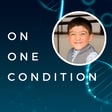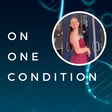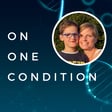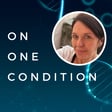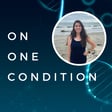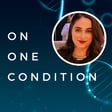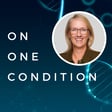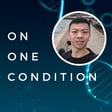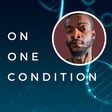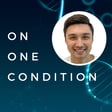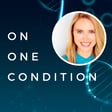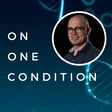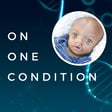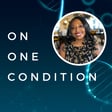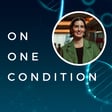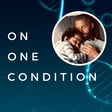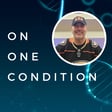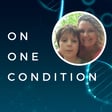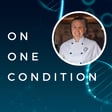Become a Creator today!Start creating today - Share your story with the world!
Start for free
00:00:00
00:00:01

Episode 45: Sierra Phillips - Warsaw Breakage Syndrome
In this emotional episode of the podcast, Sierra speaks about her journey as a mother to Jack, who was diagnosed with the ultra-rare Warsaw Breakage Syndrome. She opens up about the complexities of Jack’s medical challenges, including a congenital heart defect, microcephaly, and severe growth restriction, all of which were discovered early in her pregnancy. Sierra emphasizes the importance of trusting her instincts and being Jack’s fiercest advocate in a healthcare system that often left her feeling overwhelmed. She turned her experience into action by creating Librarey, sharing what she learned to help parents in similar situations.
Sierra chose the song Make You Feel My Love by Bob Dylan.
Transcript
Introduction to 'On One Condition' Podcast
00:00:00
Speaker
Hi, I'm Silva Bertolo, and you're listening to On One Condition, a podcast to raise awareness about health conditions by listening to people who leave them every day. My guest today is Sierra Phillips, and we're going to talk about Warsaw breakage syndrome. Hi, Sierra. Thanks for joining me on the podcast. How are you? Hello, doing well. Thanks for having me.
00:00:25
Speaker
So we're going to talk about your son Jack who has Warsaw breakage syndrome but before that I love starting with a song so which song did you choose and why? I chose ah Make You Feel My Love by Bob Dylan. um I listened to it a lot when I was pregnant with Charlotte and Jack. So Jack is a twin. He's a twin sister, Charlotte. And we knew very early on in my pregnancy that Jack had a congenital heart defect, um as well as microcephaly and severe growth restriction.
Challenges During Pregnancy and Birth
00:01:02
Speaker
um We traveled during COVID to multiple different hospitals to get second opinions and find where we thought would
00:01:11
Speaker
give Jack the best chance and would have the best care. And we were ready to uproot our whole lives and move wherever it would take to make the best choice for Jack and Charlotte. And there's a line that in the song that goes, I would go to the ends of the earth for you to make you feel my love. And that is what resonated with me. And it's why I chose the song. Making me emotional. Try not to cry.
00:01:39
Speaker
yeah It's a lovely song. I love that song as well. ah So I was about to start with a ah very open question about the first signs, but you said that you discovered about Warsaw breakage syndrome during pregnancy then. We didn't know it was Warsaw breakage syndrome. We knew that Jack had a complete AV canal heart defect, which is most commonly seen in children born with Down syndrome. We also knew that he had microcephaly and severe growth restriction, which is not common in children who are born with Down syndrome. I have a educational background in human genetics. So my brain was screaming, this is something genetic, but not sure what. And that we would wait until they were born.
00:02:35
Speaker
to start doing g genetic testing to figure out exactly what it was. But yes, I knew at 16 weeks pregnant with the twins that Jack had a pretty severe heart defect and by 20 weeks, growth restriction and microcephaly. And I was on bed rest and getting ultrasounds every other day from 20 weeks until 33 weeks when they were born.
00:03:03
Speaker
Well, that must have been a stressful pregnancy then. Yes. It was stressful. It was COVID. So super lonely, super isolating. I didn't do much except for go to doctor's appointments and you know hopped on an airplane to go to Texas Children's to get a second opinion from them and to see if we needed to temporarily move to Texas to get the best care for Jack. Thankfully, they, after doing two days of full workups, they and a lot of imaging, they determined his heart defect didn't seem as severe as the local team here thought, and that he should probably be just fine being born um at our local level for NICU, and that he would do well, and they were right, he did really well in the NICU. Well, so they managed to do all this while Jack was here? Yes, in your tiny.
00:04:01
Speaker
like inches big. Jack was born at 810 grams. So not even two pounds. um He was so so small. So that, you know, at 16 weeks when they diagnosed the heart defect, it's just mind blowing the technology because the heart's like, i it's insane how well the, you know, the imaging works. Well, that's incredible. And then so ah did you go to full pregnancy then or?
00:04:31
Speaker
They were delivered at 33 weeks because Jack um had reverse blood flow in his umbilical cord. Okay. Could you explain what that means? um It basically means that he was no longer getting like nutrients and oxygen through the umbilical cord, that the flow of the blood and oxygen was going the opposite direction,
Post-Birth Complications and NICU Experience
00:04:52
Speaker
reverse flow. So not from me to him, it was going the other direction, which is super dangerous. And um he needed to be delivered right away in that At that point he was going to grow better on the outside than on the inside. Yeah. How did you learn about that? Cause you need to imagine that you need to react quickly, but you need to be monitored. I was being monitored every other day. Okay. Well, that's good. Yeah. Intensely very long ultrasounds every other day or 13 weeks. Gosh. So did you have to go to the hospital every other day then? Yes.
00:05:28
Speaker
wow Oh, yeah, stressful pregnancy, but ah did it go well then? It did. earth and and afterwards He did soe so well, especially um at the beginning, the doctors weren't sure he would even make it to viability because his umbilical cord was super puny.
00:05:48
Speaker
And he wasn't doing well. He wasn't growing. ah He, when they were born, he actually did better than Charlotte. um He had higher Apgar scores. He didn't need surfactant. He didn't need as much time on the billy lights or on oxygen. He was off of all of that before her. He was taking full bottles before her. He probably would have been discharged from the NICU before her, but he needed to be over 1500 grams.
00:06:18
Speaker
to leave the incubator um to get into an open air bassinet. And then once that happened, we were home 48 hours later. He was, I think, the third smallest baby the hospital had ever discharged from the NICU. He weighed like three pounds on the dot. Wow. How long did they stay at the hospital? Charlotte stayed for five weeks, and Jack was in the NICU for six weeks. Yes. were did Were you allowed to stay with them all that time?
00:06:47
Speaker
So ah the rule was no, but they made an exception because I was there every day. We had a nice spot in the NICU that had room for a second bassinet. So for the week difference, I just carted them back and forth. I mean, carted Charlotte back and forth and she came every day with me. Okay. Well, that's nice that you could do that.
00:07:10
Speaker
So I mean, contact is so important between, well, especially I imagine with twins, not only between them, but then between them and yourself. And for you, it must be so difficult to leave the hospital without your children. Oh, ah I cried every day. Every single time. It never got better. It just is the most unnatural, weirdest feeling.
00:07:40
Speaker
And then especially at the end, taking Charlotte home without Jack was really hard, but I'm so thankful. It was only one week, um, that we had to have them split up and traveling back and forth. And Charlotte was a trooper because the hospital they were born in was over an hour away from our house. Okay. And so we know we would wake up, feed Charlotte, pack up the car, drive to the NICU, spend all day with Jack, drive home, do it again.
00:08:09
Speaker
But yes, it was hard, but um you know our NICU state was pretty short in comparison to other children who were born with some big medical complexities. So i we were so lucky that Jack did so well in the NICU.
00:08:26
Speaker
yeah ah So you mentioned heart defects, microcephaly, growth restriction. So that was in utero essentially. but to Does it still have any impact on Jank now? Yes. And then I can add more to the story with some other clinical manifestations popped up a couple months later. like He stopped eating around three months old and ended up with a feeding tube, which he still has. But his heart is repaired. He had his open heart surgery in May of 2022 and is doing wonderful. He no longer requires constant oxygen, which he was on before the heart surgery. um He now only has to go to cardiology once a year.
00:09:21
Speaker
which is amazing. He still has microcephaly, something he will never grow out of. um And he is still short for and small for his age, which is also something he won't grow out of. It's part of Warsaw-Brigley syndrome. It's a cohesinopathy and the cells all over the body and every system do not divide and grow as normal cells do. Everything goes grows way slower.
00:09:49
Speaker
So he's always going to be small. And that also is why they sometimes struggle with like gaseparesis, like their stomach doesn't empty as fast as, you know, typical. So a lot of them struggle with that. And another thing about Jack is he is deaf. um And that's a pretty big part of our story. And That is also part of the syndrome. The cochlear nerves are super small and hypoplastic because the cells just didn't divide and grow um when the brain was developing. Okay. We're going to come back to that, but first of all, you mentioned the feeding tube. yeah So what was the reason for him needing a feeding tube into his stomach? Yes. So about three, four months old, it was July of 2021.
00:10:48
Speaker
And they were born in March of 2021. Um, he basically one morning woke up and just stopped drinking his bottles. And I learned that that is when the automatic suck reflex kind of turns off for most babies. Um, and once that happened, he just stopped taking a bottle, would not take a bottle. It was super scary and super hard because I was having to do a daily weight checks.
00:11:14
Speaker
because he was so small and all the doctors were so concerned and I was having to report every day like how many ounces he gains. And so I ended up taking him to the hospital that day after like six hours of not being able to get him to eat much because I was so worried about him losing too much weight and and becoming a big deal. um He stayed for almost a week and he had an NG tube. um So a nasal gastric feeding tube that goes through their nose.
00:11:44
Speaker
And he hated it. I hated it. He screamed all day, every day. Um, and about a month later, we ended up back in the hospital for almost a month. And he had a big diagnostic workup across multiple specialties and he ended up with a G tube. So a feeding tube that's placed directly into his stomach and he still has it and uses it today.
00:12:11
Speaker
Okay. Does he feel better about that? Oh yes. He, yes. Oh yes. it ah It was a huge game changer. Um, and I am really happy. I pushed so hard for it. They, um, did not want to do it. They usually make people wait and they told me that he would probably go out of the feeding difficulties. It was probably related to his heart defect. It was probably just fatigue. Um, and they really didn't want to do another surgery, especially one that could leave a scar.
00:12:42
Speaker
if he outgrew the tube. And my response was, well, he's about to have open heart surgery and have a massive scar down his whole chest. um A tiny little scar on his belly is the least of my concerns. I just want him to feel better.
00:12:58
Speaker
How do you deal with pushback from experts in their field? and And I'm asking the question because I keep hearing that from from patients and caregivers, but it sounds like you didn't wait and straight away you advocated for him. Yes, and that was probably my One of the first times I really advocated hard, we ended up transferring hospitals because of it. The original hospital refused to do the surgery. So it wasn't, you know, the timeline was not a part of their standard of care. Most, I think it was either six months, they required you to be on the NG tube before discussing switching to a G tube.
Emotional and Caregiving Struggles
00:13:46
Speaker
We weren't like, that was not feasible for us. He was miserable. He was screaming. I had to take a leave of absence from work because I had to physically hold him.
00:13:54
Speaker
every time we ran the feeding pump, which was basically all day. um And that was not sustainable for me. It wasn't for our family. It was miserable for Jack. um Screaming, crying, arching his back, but trying to yank it out. It could only go on the one side because he has like a deviated septum on the other side. And so it just it wasn't going to work. And I knew, it was my mom instinct that I needed a G-tube. And that was going to be the better course. and if he outgrew it and they were right that it was related to his heart, but you know so be it. He's gonna have scars, a tiny little scar on his bellies, not gonna be a huge deal, but he didn't outgrow it. It wasn't related to his heart um and he still uses it today.
00:14:42
Speaker
Well, yeah, it's so important. Well, first of all, feeding is obviously important, but there is so much risk of leading to trauma with things that are so difficult to accept for Jack. And even for you, I imagine that it makes your relationship with with him completely different because you're particularly in a situation that you don't want to.
00:15:11
Speaker
Yes, that was so tough. um The first really two years, I felt more like you know ah his his nurse, his caregiver, less like his mom. I was the one having to do all of the painful procedures and therapies and taking all the appointments and holding them down for blood draws and for the tubes. And ah you know that thought always crossed my mind is, you know Does he love me the same as Charlotte? Because I'm having i'm the one who's you know bringing him to all these appointments, holding him down. like you know He associates me with doctors, therapy, procedures, hospital. But I don't think i think he knows. um He's nonverbal, but I think he knows. um Even though I'm the one who takes up all the appointments and is with him for most of the scary stuff, he still comes running to me.
00:16:07
Speaker
um for you know when he's sad, when he's upset, when he falls, when his sister takes his toy. um Yesterday after his first day of preschool, he when he got home, he came up and ran to me and gave me a huge hug and showed me the picture he colored. um So despite all the trauma are and my worries about what our bond would look like, um I don't think it's really any different than my bond with his sister. you know We both are very close. and they you know, I'm their mom first and his caregiver second. Yeah. And his eyes. Yes. yeah ah So how do you communicate with him? So you said that he's deaf. He is deaf. He has cochlear implants and um he, we use like a total communication approach. We sign hit. He um can hear very well with his implants. He understands.
00:17:07
Speaker
English, his receptive language skills are great. He's just very delayed with his expressive. um But he we use a hybrid approach. He's starting to say some words last week for the first time. He said fishy. um And he says, Mama, love you. ah So we're working hard, but we kind of let him lead and we sign when he signs and we, you know, we talk, we do it, we do it all. A very non-traditional approach. I just want to give him all the options and whatever works best for him is what we do. Yeah. How does it work for preschool then for him? Well, he just started. Oh, okay. Yesterday he had a good day, um but he has a personal care attendant and she went with him. um So she'll be there with him in school. He's in a private school um to help with communication and to, you know, do his feeding tube and meds and kind of keep an eye on things. I'm hoping, we both hope um as the school year progresses that she will be able to, you know, give him more independence in the classroom and maybe, you know, go in as needed um or if the teacher needs support or help communicating for a specific activity. um But the first couple of weeks, she's probably going to be in there with him the majority of the time. um
00:18:34
Speaker
helping him get used to the routines and helping the other kids and the teacher learn how to communicate with Jack and what his different forms of communication mean. Okay.
Navigating Medical Systems and Diagnosis
00:18:46
Speaker
But is it something that is easily accessible, having all this help for Jack, or is it something that you have to push for a lot? And I know in the UK, like from personal experience, you have to fit very specific case like boxes to be able to access the right level of support. So I'm going to back up a little bit and tell a little bit more about the story. um So after Jack got his G-tube, that is when I pushed really hard for whole exome sequencing. um He had a karyotype and a microarray after birth, both came back um normal. But I knew this was something genetic. I demanded whole exome. We ended up getting the results of his whole exome sequencing in December of 2021, that he had Warsaw breakage syndrome.
00:19:43
Speaker
I'd never heard of it. I immediately go to PubMed for reading all these papers. Every other kid with Warsaw-Ricke syndrome that's been published about was profoundly deaf, like bilateral since renewal hearing loss. And that was the first thing that, and Jack passed his newborn hearing screen and passed an ABR at three months old. So I had no inklings that Jack was deaf. He was babbling. He was laughing. He was, you know, um his sounds weren't as complex as his sisters, but He did conversational pausing and kind of the things that were decently age appropriate. But the getting the results of the whole exome sequencing and knowing exactly what Jack had, Warsaw-Briggs syndrome, and learning more about it is what made us go back and get another ABR, which showed that he was flatline, like profoundly deaf in both years.
00:20:38
Speaker
um It took us a while to get implanted because we had to wait for his heart surgery first. They didn't want him going under any other operations until the heart surgery was done and he had healed. In that time, we had a lot of hospital expenses. I was paying for Jack's private duty nurse care attendant out of pocket.
00:21:01
Speaker
ah we were drowning in debt from the NICU bills from multiple hospital stays and surgeries. Jack had a helicopter an emergency helicopter ride. um I got that bill. It was $75,000 and completely broke down. And we happened to go ah to a friend's house and a mutual friend was there that I didn't know. And i she could tell that I was upset and she came over and talked to me And I'm telling her the story and basically like word vomiting, like dumping all of this information on her. And she looks at me and she goes, does Jack have a waiver? And I said, what's that? She says, a Medicaid waiver. He definitely qualifies for a Medicaid waiver. Jack was 11 months old when this conversation happened.
00:21:51
Speaker
um So eventually, yes, but it took a lot of work and then um We applied, you know, we had the initial screening in February of 2022 and we weren't like set up and getting payments for his attendant until August.
00:22:14
Speaker
So it's a huge financial burden. like my yeah Like I was paying still out of pocket because I didn't want to lose his attendant. We like, we needed her. Um, they backdated everything, but it's a lot of work. Um,
00:22:28
Speaker
People either don't know about it. They don't qualify. They don't know how to appeal. they don't um There's not a lot of help. And the waiver does not pay a lot. I think it's, don't quote me on this because the price has changed in July, but it's around like $14 an hour, which is nothing. So it there's a huge shortage of care attendants and private duty nurses because the waivers don't pay enough and they can make way more money working for the hospital or a, you know, a company. Yeah. How come the hospitals didn't tell you about the waiver? I'm not sure. So that's a good question. Originally I chalked it all up to, you know, our kids who were born during COVID and there were, you know, we didn't see social work in the NICU. There was like very limited who they allowed and no visitors, only one parent at the bedside.
00:23:28
Speaker
um I thought maybe that was why, but after you know starting to tell our story and find and connect with other parents, I've realized that this issue of you know lack of information sharing has been going on forever and it's still happening, that it wasn't a COVID thing. It's a systemic problem we have here, and I'm not really sure why and what makes it even more crazy in the United States is every state has different rules and different programs and some states have wait lists, some states don't, some states let parents be paid caregivers, some states don't, some states allow for respite hours, some states don't, some like it's insanely hard to navigate and that's not the only, you know, and what other services, what nonprofits, like what grants, no one tells you any of this.
00:24:27
Speaker
which is what
Creating Resources for Rare Diseases
00:24:28
Speaker
led me to start compiling all this information together. And um I have a rare disease and disability resource database called library. That's like open source so people can add things they know about where they live um because it was every, you know, everything was, wait, how did I not know that? How did, how come no one told me this? How did we not know there was a DMI, which is um a physical therapy intensive center here in Richmond?
00:24:57
Speaker
has like a year long wait list. Like if I had known that a year ago, I would have gotten Jack on the wait list, but no one told me. Um, it's a huge problem, not just around like, you know, financial support and nursing support, um, but around all of the resources that are out there for families who have children with rare diseases or disabilities, chronic illness. It's a huge problem.
00:25:21
Speaker
Yeah, it frustrates me. It sounds like if you don't ask the right question, then no one's going to offer the answer. And you don't know, but you don't know. So if you don't know to ask the question, if you don't know, something exists. Yeah.
00:25:36
Speaker
yeah ah So we'll come back to library, but before that, so if I'm not wrong, Warsaw breast cage syndrome is ultra rare. So is there any support that you get regarding like Jack's symptoms specifically? And do you know how it can evolve in the future? No, like, well,
00:26:07
Speaker
When Jack was diagnosed, there was not a like nonprofit for Warsaw Prickly syndrome or a patient advocacy organization. Couldn't even find a Facebook group or any other humans, like families on the internet. All I could find were the papers in PubMed. I eventually, using hashtags, um found so other families and we have a Facebook group and we all kind of pull our questions and ideas in there. We are working on Launching a non-profit. We have everything up. I just haven't filed for nonprofit status yet um But there is no like Center of Excellence or you know expert and Warsaw Frigge syndrome um It's really become the parents who are ed, you know when we go into the hospital I get the same response for most doctors is oh I googled it and I can't find much And I'm like, yes, that is that is accurate
00:27:05
Speaker
um Jack has epilepsy. And when we were going through that workup, the doctor came in and she said, well, I Googled it. And I don't see any of these other kids in these papers um having epilepsy. Are you sure? He's having seizures. And two days later, we left with seizure meds. So most of the support specialized support is because I've advocated and pushed for things um and had
00:27:36
Speaker
to spend time like doing research, asking other families, getting on our Facebook group, being like, hey, do any of your children struggle with you know chronic congestion? you know And like what have you done? What has worked? And then taking that information back to our doctors and being like, hey, this family, also their child is having focal seizures, and this combination of meds worked best for them. Can we try that for Jack?
00:28:03
Speaker
So it's really the burdens on the parents. Yeah. So so you're doing what you would expect them to do essentially. Yes. Doing the research yourself. I mean, it's great that you have the Facebook groups to do that, but you shouldn't be in a situation where you have to rely on on that. No. And I love, you know, doctors are amazing. We've had wonderful doctors who have saved Jack's life multiple times. I always try to be careful about how I like,
00:28:33
Speaker
phrase that part because it's not necessarily their fault. um It's like the healthcare care system here in America. They're all overworked and overburdened and they have to see way too many patients. They don't have time to sit down and do proper due diligence and like read the chart and like really do a deep dive. They're going from patient to patient to patient to patient. So it's like hard. I don't, you know, it's not their fault. um It's a, you know, a system problem here in our healthcare system.
00:29:01
Speaker
And it's not just in the image. Yeah, no I mean, yeah, it's everywhere. But I hate being like, you know, the doctor should be doing it, you know, they should, they should. But they also have to meet their metrics and their numbers and see all the patients they have to see. And there's just not enough time. And the burden falls back onto the parents, which it shouldn't. But, you know, there's no other option right now. Yeah, no, no, I agree. But I think you you're Your message, what I'm hearing from you is very important that you need to do your own research. You need to ask around. You need to look at other examples and then see if it applies to yourself or your your child. Yes. yeah I would say doctors so are the experts. They are the doctors, you know but they only know so much and they don't have
00:30:00
Speaker
you know, science and medicine changes every day. Um, they don't know everything. And if you have a gut feeling, don't let it go. Look, ask around. It's okay to get second opinions. Um, it's okay to like take something to your doctor and be like, you know what? I hear you, but I would like to try this or I disagree. Or I, you know, I would, you know,
00:30:28
Speaker
If you have a gut feeling about something, don't let it go just because the doctor might dismiss it or have a different idea. Yeah. Yeah. So going back to library. Is that specific to Warsaw breakage syndrome or is it more about? No, it's all rare disease, disability, chronic illness, neurodivergence. It has resources for anyone who may need any kind of extra support in any area. It has information on financial assistance and like insurance, ah camps for kids with disabilities, respite vouchers, um different nonprofits that support families who have rare disease and medically complex kiddos. It has books, podcasts, um products, information on
00:31:26
Speaker
programs in specific cities and states, and I'm working on expanding it. The majority of the information right now is in the United States by state, but working on expanding to other countries. There are some resources for Europe, Australia, Canada, um working on expanding, but i wanted you know I wanted to launch it with the whole world, but had to start small. So started with the United States and really working on getting it fully fleshed out here and then branching out to the other countries. And it's, you know, family sourced, so you can submit your own resources that you find or have come across and um we vet and approve everything and then they're added. You can, you know, comment, like, share, build your own collections. We now have a really awesome calendar that has lots of
00:32:21
Speaker
like rare disease and disability conferences, expos, awareness days. You can um now embed on, if you have like a patient advocacy organization, you can embed a custom collection on your website. That's like, you know, tailored for your disease state. um It's meant to be all encompassing and really like be a one-stop shop for anything you may need, medical, non-medical, financial, fun.
00:32:52
Speaker
All of it. Wow. So it it is a real library then. Yes. Well, that's incredible. Did you build it yourself or did you start it with others? So the original version was like a word doc that I turned into a PDF that would let you know, I just would work on it every night instead of staring at Jack's pulse ox. Um,
00:33:19
Speaker
tried to put my nervous, anxious energy you know somewhere else. um But then the PDF got too big. It was almost 500 pages. And it became really cumbersome. It was like you know crash computers. It was hard to navigate on cell phones, which most parents are you know looking at on a cell phone. And it just happened. At that time, I was doing research on you know what else was out there for the rare disease community specifically that wasn't.
00:33:45
Speaker
disease specific and I came across this website called commend and they were launching soon, signed up to join our wait list. So I joined the wait list. They reached out to me and we did a couple like design sprint ideas for what they were thinking of. And after we did a couple of working sessions, the guys asked me, you know, if there was anything they could do for me that, you know, they really appreciated all my, you know, insight and help. And I said, actually, yes.
00:34:14
Speaker
I would really like to take this clunky PDF and turn it into a website, um, that is, you know, more accessible and easy to navigate. Um, and that's how it started. And I'm that process started, I think may or June of 2023, the website went live in October. So we're almost at a year and we've been working on it ever since. Amazing.
00:34:40
Speaker
How many people do you do visit the the website? Do you know? Oh, I don't know. I should know. um i It's a nerdy question. Sorry. They know they keep, um we have our team is growing. So Albert and Swanson and I were, they are the co-founders of Commens and then I came on and we built library, we now have a product manager and a second full stack developer and a social media manager. um and They are, you know, they keep track of all of the website traffic and we have a TikTok now and I think YouTube, they're doing all sorts of great things, um working on building some other products to help the rare disease community.
00:35:27
Speaker
um So We've been very busy and have been doing a lot of you know research and fact finding and um asking people to play around with things and give us feedback. like What would they like to see? What's missing? What's not working? What's working? The first year has been it's been a whirlwind. I can't believe you know ah it's been a year almost already.
00:35:53
Speaker
Well, it's amazing. It's brilliant. We'll put a link to the website on next to the the podcast so people can find it easily. You you talked about conferences as part of library. I've always wondered, are conferences very useful for patients or caregivers?
Jack's Joys and Reflections on Life
00:36:20
Speaker
Yes. there Well, there are different types.
00:36:23
Speaker
There are different kinds of conferences. um There are conferences that are geared towards um academics and researchers, conferences geared toward medical, doctors. um And then there are conferences that are geared toward patients and families. um There are larger ones, so I am going to Global Genes, Week in Rare, in a couple of weeks here. That is really geared towards caregivers, families, patients,
00:36:53
Speaker
you will see people in the medical profession and in the drug development biopharma world there also. NORD, the National Organization for Rare Diseases, also has like a patient, family-friendly conference in October. um Lots of the patient advocacy organizations have family conferences where they try to get as many you know people from their community together once a year where they talk about updates and all get together and share those on the library also. um But we are working on like a color coding system to kind of help people tease apart which conferences are geared toward which kind of audience. But I've also seen plenty of um friends from the real world who don't necessarily have a scientific or medical background attend some of the other conferences.
00:37:50
Speaker
just because they want to make connections. They want to meet researchers. They want to meet doctors who might be interested in helping them. It's all dependent on like what your goals are and what you're trying to get out of the conference. Yeah. Yeah. And I guess there's an aspect of learning, but also an aspect of sharing because it's important to share the voice of the patient or the caregiver because we know that people will need to hear those stories to sometimes take action.
00:38:20
Speaker
Yes, it really helps to bring some of the anecdotal, not anecdotal, but if a doctor is presenting a case study at a conference, it doesn't quite hit the same as if you have the patient or the caregiver up there alongside them, like sharing like what's not in the chart. Yeah, I agree.
00:38:43
Speaker
Well, it's amazing. I absolutely love what you've done and what you're still doing with the library and the fact that you've turned what seems like frustration into so much energy is incredible. I always love finishing with the same question. ah What is Jack's happy place, the place where he feels at peace?
00:39:14
Speaker
the aquarium. Jack is obsessed with all things ocean life, especially sharks, but loves everything. He knows the signs for every ocean animal, um loves the aquarium. He loves, you know, if we obviously we can't spend every day at the aquarium. um Animal videos, aquarium tours on YouTube, Finding Nemo, Finding Dory,
00:39:40
Speaker
Um, anything related to the, we have a ah pool. We just moved to a new house. I have a pool. He's obsessed with the water and all of his fish. So he fishy, fishy, fishy. Um, he always says, and he pangs on the door to go outside to go get his fishies and get in the pool. Um, that is his happy places, the water, the ocean, um, and his fishies.
00:40:02
Speaker
Nice, amazing. and I could be beyond with that because I love an aquarium as well. Same. It's super soothing for me too. yeah I love the aquarium videos on YouTube at night. We do that after bath time while we're getting ready for bed. It's nice and peaceful and relaxing for all of us. Amazing. Well, thank you so much, Ciara. I really appreciate your time and We've learned a lot today. We've talked about things that we haven't really talked about on the podcast so far. so And I think it brings some practical ah tips for for parents who may be going through the same situation. So thanks a lot for that. Of course. that's the whole you know The reason why I put so much effort into it is I just want to give back and help other families. I knew how helpless
00:40:59
Speaker
we felt and if I could help you know one family a day with something, it's a good day. Yeah, I agree. And I hope it goes well for Jack at preschool and he loves it as much as aquariums. Yes, that is my hope. Thank you so much. Thank you.
